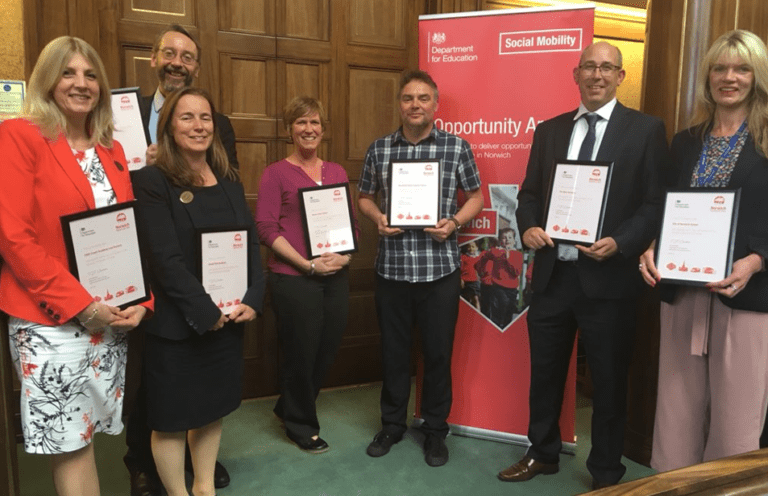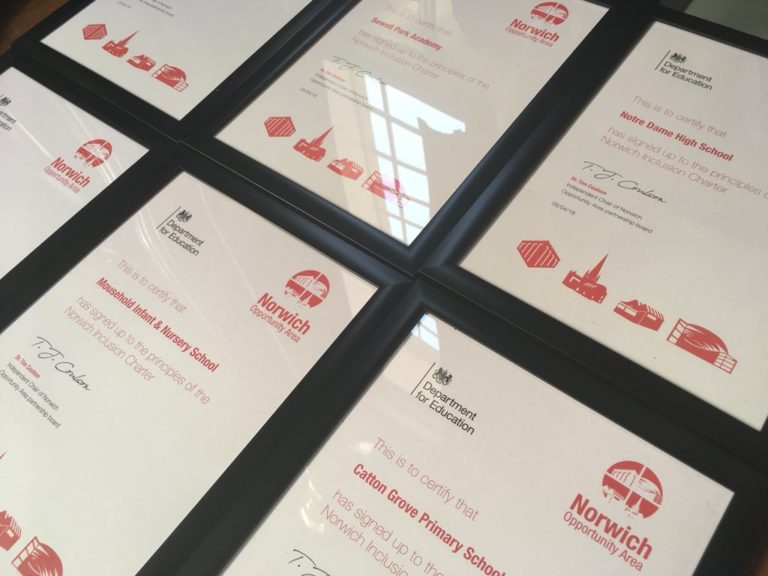Bringing together schools for open and honest discussion and to develop trusted relationships. Facilitating consensus over time led to joint commitment around a shared challenge.
#311
Norwich Inclusion Charter
A city-wide charter of agreed principles, developed collaboratively by local schools with the aim of improving inclusive practice and reducing levels of exclusion.
Audience
Head Teachers / School Leaders, Local Authorities, School Teachers, TrustsAimed at
KS1, KS2, KS3, KS4, KS5Outcome
Community Support, Inclusion and SENDApproach
Place BasedWhy was the project needed?
In the Norwich Opportunity Area (NOA), rates of permanent and fixed term exclusions were too high. A target was set by the NOA to reduce the 2017 figures by two thirds by 2020. Schools fed back that they could struggle to access the required support or provision that their pupils needed to succeed and that they needed to improve inclusive practices and reduce levels of exclusion.
What happened and what was the impact?
The Norwich Inclusion Charter was created; a set of principles that primary and secondary schools committed to, aiming to ensure pupils at risk of exclusion are supported. All schools who signed up to the Charter nominated an inclusion champion and could access funded support. An online self-assessment tool was developed for schools to self-assess the detail under each of the principles.
The Charter was developed with significant input from schools and wider stakeholders in Norwich, based on their knowledge of local challenges, experience and their ambitions for the future.
All schools who signed up to the Charter nominated an inclusion champion from their school who would know every child at risk of exclusion. Inclusion champions were pivotal in working alongside the NOA to share their needs and barriers around inclusion.
Schools signed up to the Charter could access funded support. These included whole school inclusive culture packages, reviewing school behaviour policies and accessing short term off-site Alternative Provision placements for identified pupils. This support was delivered through drawing up specifications and going out to market for providers through tendering processes.
Schools were also invited to apply for grants in an attempt to reduce or mitigate the numbers of pupils being excluded in a timely manner and to develop and test new approaches within their school.
In 2019, after consultation with schools and a period of reflection considering evaluation reports and impact data, the Inclusion Charter principles were reduced from five to ten.
An online assessment tool was created for schools to self-assess the detail that sits underneath each of the five principles of the Charter. This was designed by schools and launched in Spring Term 2021 (see resources section below to watch a Webinar discussing the use of the assessment tool at Norwich Primary Academy).
Please check out the links to case studies included on this page that demonstrate how the Charter has had an impact at a local level.
What did and didn't work?
We provided local school leaders with the opportunity to work together around a shared ambition creating a climate where new conversations, cultures and approaches could be tested and where schools were keen to work together to improve outcomes for local children.
For most schools, the Inclusion Charter provided a focus on inclusion and inclusive practices in their school. Secondary schools began opening dialogues between meetings and the Norwich schools now collaborate early and honestly with each other in relation to the movement of pupils. This development has been welcomed by the Norfolk County Council Fair Access Panel.
Inclusive culture and behaviour management packages were embedded more successfully at primary level and many have gone on to further develop their expertise in schools through grants that provided additional continuing professional development (CPD) for staff.
The Charter was originally developed through consultation with a network of teachers. As the most effective approach to writing the charter initially, it was just a starting point. Over time, some of the principles of the Charter could be combined and it became clear that schools were including many of the starting principles within their School Development Plans. This meant the Charter principles could be reduced and the commitment made far more succinct. Significant learning came from the associated projects and interventions.
For some schools the Inclusive Culture Package they chose wasn’t a good fit with their whole school approach. Not all schools attended provider showcase events so some missed out on opportunities to find out full information about their options and make informed decisions.
How did you measure success?
Indications are encouraging that for those schools who have embraced and fully engaged with the Charter and taken advantage of CPD and focussed intervention and grant opportunities, exclusion rates have either reduced or are stabilising.
Wisdom
Ingredients For Success
Is the Project Complete or Ongoing
The NOA Norwich Inclusion Charter project is now complete.
How is the Project Sustainable
CPD underpins the Charter Principles and once embedded within a school are sustainable. Strong networks have been developed so we have confidence that sustainability will also be achieved through schools continuing to collaborate and to share good practice and resources beyond the life of the NOA.
What are the Long Term Impacts
Working closely with colleagues at NCC has ensured that engagement with the Inclusion Charter is shared with the local authority and successful approaches can be embedded and shared with other areas in the county.
Estimated Costs
Resources included the time of school and local authority contacts involved in developing and writing the Norwich Inclusion Charter. Some schools took up funded offers designed to support them to meet the principles of the Charter – costs per school varied according to what they took up.
The Inclusion Charter has encouraged more shared working between schools in regards to managed moves and avoiding pupils being permanently excluded.
Feedback from a Norwich secondary school teacher.Area Most Impacted
Mental Health
Inclusion
Transition
Next steps to do something similar yourself
These are a list of Big Idea resources that you can use to implement in your setting:
This is the original Inclusion Charter which we launched to schools in 2018:
This is an updated version of the Inclusion Charter in 2021, after review and feedback from local schools:
Watch this Webinar delivered by Heather Denny, Vice Principal at Norwich Primary Academy, giving an overview of the Norwich Inclusion Charter that Norwich primary and secondary schools have signed up to, and the new assessment tool designed to help schools self-assess their practice:
Watch a lecture about inclusion and Schools of Sanctuary given to trainee teachers for the Norfolk Teacher Training Centre in March 2021 by Will Turnpenny, Assistant Head, Inclusion Lead and School of Sanctuary Lead at Magdalen Gates Primary School:
Watch this Webinar to hear about approaches to identify and support young carers in your school:
Follow these links for information about the Young Carers & Families Support Service and the Young Carers Support App:
Some schools received funding from the NOA to complete Thrive Approach training. Check out the case studies from schools who have implemented this approach (links on this page) and the Thrive Approach website:
Read the EEF Guidance Report on Improving Behaviour here
Read the EEF Guidance Report on SEND in Mainstream Schools here
Champions and contacts
Authors
Hub Contact Details



If you've got any thoughts and ideas of how this approach could be improved or an positive impact it's had for you, add them below
Login or register now to post any comments